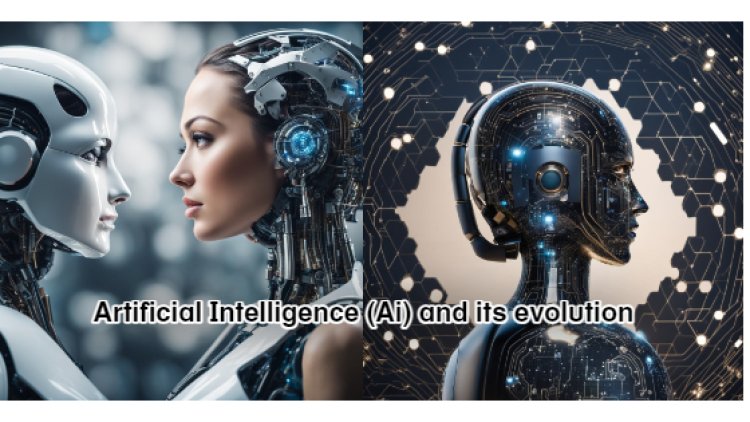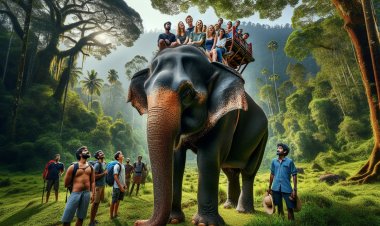Artificial Intelligence (Ai) and its evolution
Artificial Intelligence and its evolution - Artificial Intelligence is a computer science subset that uses algorithms and large datasets to perform tasks requiring human intelligence, with applications in various fields and a focus on ethical use. Evolution of Artificial Intelligence - The Evolution of Artificial Intelligence traces from 1950s machine learning to today's autonomous systems, with the future promising Artificial General Intelligence (AGI) for wide-ranging tasks at a human level.

It's quite a trip—the story of artificial intelligence's (AI) evolution. Imagine that it all kicked off in the mid-20th century with the birth of the first programmable digital computer! From basic rule-based systems, we've now got our hands on some seriously advanced machine learning and deep learning models. AI has shaken up countless industries, and it's not stopping anytime soon; it's still revolutionising our lives every day.
My name is Abe Abrams, and I am inviting you to a short journey through a wild and wide content.
AI is a bit of a whiz kid in computer science, always trying to mimic human intelligence. It learns from experiences, deciphers complex notions, and is skilled at problem-solving, perception, and understanding language. It has two main branches: narrow AI, which specialises in certain tasks only; and general AI, which aims to tackle intellectual tasks on par with a human brain. We can't ignore machine learning, deep learning, and robotics, as they're also critical parts of this AI puzzle.
AI finds its way into various nooks and crannies in our lives—guiding self-driving cars, aiding healthcare diagnoses, running voice assistants, even shaping personal recommendations! It's making waves across banking, agriculture, climate modelling—you name it! While acting as a catalyst for the Fourth Industrial Revolution.
But let's not forget the flip side. As AI integrates itself into our daily humdrum, it brings along ethical issues that need serious attention. Privacy concerns, possible job losses, discriminatory AI algorithms—all these considerations warrant prudent use and regulation.
Without a doubt, AI’s impact on society is like a double-edged sword. It boosts productivity and spurs innovations while potentially threatening jobs and increasing surveillance. Gaining an insight into these consequences is pivotal for devising effective regulation boundaries.
Looking ahead, there's no denying AI's potential. Imagining superintelligent AI surpassing human intelligence, creating art or music—it's quite mind-boggling! But along with this progress come some serious dilemmas. We need to ensure the safety of AI systems and quell possible societal issues.
However, AI isn’t perfect. It doesn't fully grasp human intuition and creativity, relies heavily on data, and the sheer complexity can sometimes make it a tough nut to crack.
The history of AI has not been a bed of roses all along; it’s witnessed "AI Winter," periods marked by a dwindling interest in AI research and funding cuts. But seeing the field bounce back and forge ahead reflects its resilience and immense potential.
The Turing Test, which Alan Turing proposed in 1950, sparked a contentious discussion about whether or not machines were capable of mimicking human behaviour. The question of whether AI can actually reach conscious understanding gets scientists and philosophers alike into quite a tizzy!
Sure, superintelligent AI is great conceptually but it's not without significant concerns tied to its unchecked development and potential risks. Heavyweights like Stephen Hawking and Elon Musk don’t shy away from cautioning against such advancements, while others think we're perhaps getting ahead of ourselves.
Oh, and the use of AI in combat? That’s a very touchy subject due to ethical qualms surrounding autonomous weapons, not to mention the potential for AI-powered conflict escalation.
Machine learning algorithms can sometimes be naughty schoolboys, unwittingly continuing social biases when trained on skewed data. This has led to some pretty controversial slip-ups, like instances of facial recognition misidentifying individuals from diverse ethnic backgrounds.
AI’s rapid expansion stirs up worries about job losses. While some prognosticate major automation taking over jobs in future decades, others believe that AI may birth new opportunities leading to a net positive shift in the employment landscape.
AI’s got talent; it's dabbling in artistic pursuits! It’s creating masterpieces, composing symphonies and challenging our understanding of creativity to its core.
AI’s journey has had its share of remarkable milestones. Be it John McCarthy coining the phrase "artificial intelligence" in 1956 or introducing HAL 9000, the early AI prototype, in the film "2001: A Space Odyssey". These instances have certainly piqued public interest in AI.
Hail the torchbearers of AI research—names like Geoffrey Hinton, Yann LeCun, Yoshua Bengio, Fei-Fei Li, and Andrew Ng. They've contributed enormously towards deep learning, computer vision, and increasing AI education.
AI is playing a significant role in combating climate change via weather prediction, optimising energy, and monitoring deforestation. Machine learning algorithms analyse oceans of data to spot patterns and make forecasts, thus aiding climate change mitigation.
The workings of AI are far-reaching in economic terms too. It spruces up productivity by automating tasks, enabling fresh business models and services, and harbouring potential for driving economic growth. However, issues like job displacement owing to automation and reskilling needs are challenges that can't be ignored.
As for global regulations on AI, it's a mixed bag. Some governments are laying down comprehensive rules focusing on privacy, bias, and accountability. Others prefer a sector-specific approach to dealing with areas like healthcare or autonomous vehicles. Creating a standardised global rulebook for AI is an increasing priority as its influence keeps expanding.
When it comes to cybersecurity, AI is indispensable. From detecting threats to swift and precise responses, AI has got us covered! It also predicts future risks and automates processes that handle complex concerns.
Even with the strides made in technology, AI has its hurdles. Whether it's understanding human intuition, creativity, or simply picking up on context and nuances, there's room for improvement. Ethical considerations play a pivotal role in steering the responsible development and deployment of AI.
As we toss and turn in the ever-changing world of artificial intelligence, weighing its potential advantages against ethical implications is crucial. Finding the right balance between progress and responsibility will determine where this constantly evolving field is headed.
TradeFxP Features
If you choose to be a self-employed retail trader, here are a few things we offer:
- The best trading Platform
- No Requotes
- Lowest Spreads
- High-level liquidity
- Interbank connectivity
- Pure STP/DMA/ECN
- Free signals
- Best support
- Crypto Wallet and withdrawals / Deposits (USDT)
- Robust CRM
- TradeFxP wallet
- Once click withdrawal
- Multiple payment options
- Local offices to walk in
- Free VPS
- Free Video Chat / Virtual Meetings
- And many more…
If you choose to be a part of our managed account program:
- All of the above +
- 1-2% Daily Profits
- High-level risk management
- Capital protection
- Only 30% of the capital used
- Negative balance protection
- Our fee is from the profits only
- Monthly profit withdrawal
- Wallet system – Use it like Phonepe, or Google Pay
- Crypto wallet and withdrawals / Deposits (USDT)
- Live monitoring
- MyFxbook Live monitoring
- Copy Trading
- And many more…
Optional: If you do not withdraw your profits for 2 months, our system will use those profits to trade and will keep your 100% capital safe and secure for margin purposes. This is optional, and if you choose not to be a part of it, you can withdraw your profits from the first month itself.
Why 1-2% daily? Can't your managed forex account earn more?
Yes, we can! Remember: greed may be good in the beginning, but in the end, it will destroy everything. You and I know that! Many droplets make an ocean! Join the Managed Account Program and sit back for six months, then look at your account. You'll see that our strategy is good and the best. Do you know what I mean?
If you choose to be a part of us as an introducing broker (IB) or channel partner,
- Industry best Rebates
- Local Office support
- Staff support
- Marketing support
- Marketing materials
- And many more…
Having said that….
You can join our Forex Managed Account program and earn 1-2% profits daily. See for yourself by clicking the below link.
Have a great journey, and may you catch some big waves on your way to prosperity!
To see Ai Forex Trading for real, use these credentials.
- Low-risk strategy:
- Mt4: 112018
- Pw: Allah@101
- Server: tradefxp live,
1. To read why you should be with us, click here.
2. To open an account, click here.
3. To see our regulation certificate, click here.
4. To see our news with the IFMRRC, click here.
5. For claims, click here.
6. For the main site, click here.
7. For blogs and articles, click here.
8. Main Website: www.TradeFxP.com



 admin
admin 










